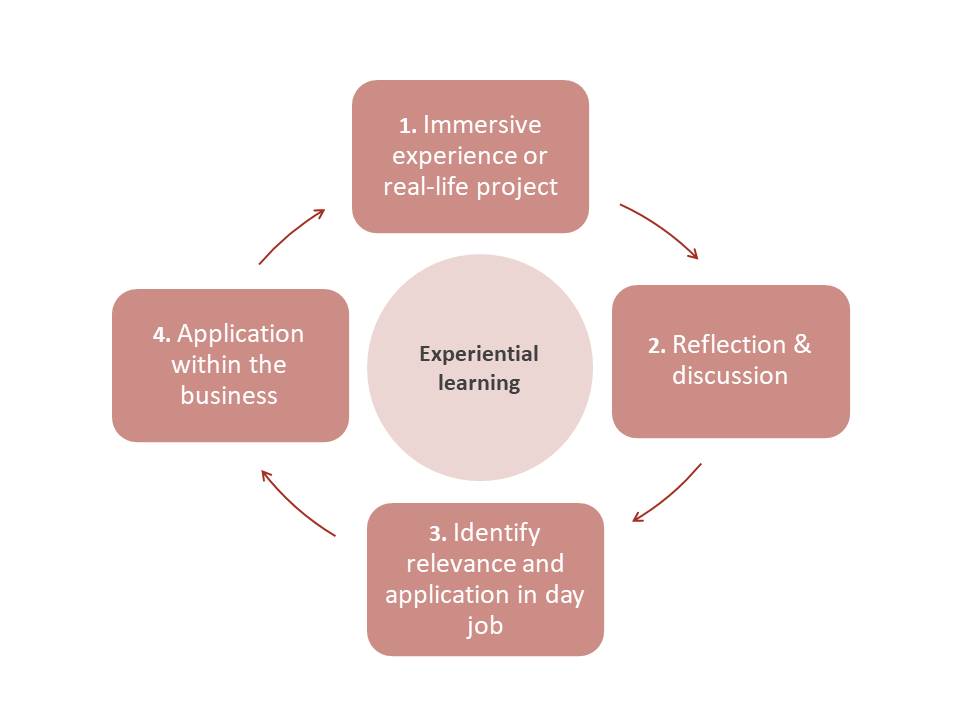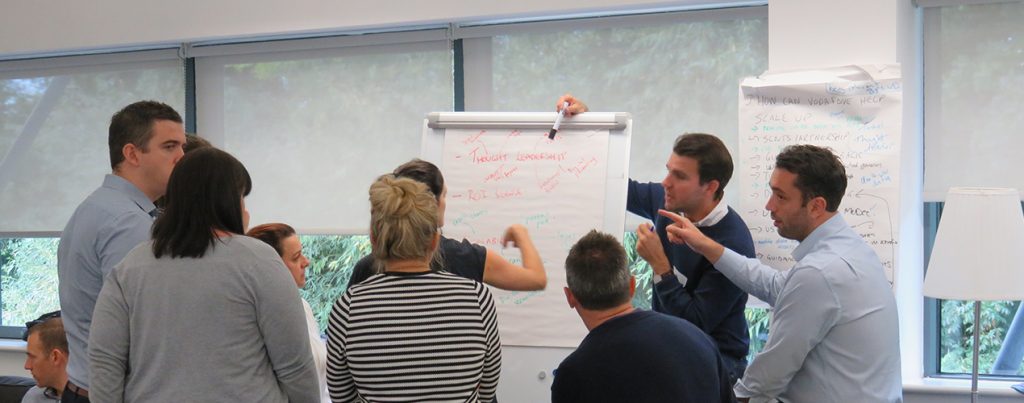Three Hands 2022 Impact Report
Three Hands UK have captured another year’s worth of impact – in a colourful and
Friend of Three Hands, Research Consultant Nicole Dulieu, shares her insights on the benefits of experiential learning.
Employers in the UK spend over £45bn a year on professional training, but research shows that the most common techniques are often ineffective (see Beer, Finnstrom & Shrader “The Great Training Robbery” 2016). So – how can businesses develop their people in a more meaningful way?
Fighting the “Forgetting Curve”
Ebbinghaus’ “Forgetting Curve” suggests that within a month of training, people forget on average 90% of the information presented to them – 90%! Experiential learning redresses this inefficiency by facilitating learning through action, through emotive experiences and through reflection – a process brought together by Kolb in 1984.
Drawing on the 70:20:10 theory (developed at the Center for Creative Leadership in the 1980s) – which observed that adults learn best by 70% on the job learning, 20% from interactions with others and 10% through formal learning – experiential learning focuses on immersive development opportunities used to complement these three areas.
Known as “training for real-world jobs”, the experiential approach combines workshops, seminars and participatory methods – such as working on real projects – to guide learners through stages of learning, reflecting, and implementing new behaviours and skills.

This guidance through an experiential learning experience, usually in the form of highly skilled facilitation, is hugely valuable in supporting individuals and groups to identify their learning and its relevance to their roles, as well as considering how it can be embedded back in the business.
“Our project was facilitated expertly throughout the two days – standing back enough to allow delegates to experience and identify what was and wasn’t working for them, and challenging at the right times through keen observations on how both personal and group objectives were being achieved.”
Charlotte Snowdon, Learning & Development Business Partner, British Gas
Tapping into emotions

What makes this training method more effective is the use of emotional cues, such as living a new experience or feeling, or reflecting on those of others. When training uses emotional cues, learners experience a richer educational experience and better knowledge retention.
This shouldn’t be surprising; from a neurological perspective, learners are more likely to remember training if it is emotional or enjoyable because these experiences cause the brain to release dopamine, a chemical that is known to improve memory.
Three Hands applies this approach by connecting business participants in their experiential leadership development programmes to non-profits and their beneficiaries or schools and students, cleverly combining a memorable and emotive learning and development experience with the opportunity for groups to learn about relevant social themes and add value to the communities where they work. This can be seen in their innovative work with British Gas, immersing employees in the lives and homes of those suffering from energy poverty to bring to life customer needs in a way that would have a lasting impact on learners, as it can through their work with Vodafone, guiding high potentials to develop key leadership behaviours whilst coaching students to train their peers on the important topics of online safety and wellbeing.
“The Drive module provided just the right amount of stretch for our participants, pushing them to develop leadership capabilities under tough conditions – an important skill in our business.”
Melissa Belbin, Learning & Development Consultant, Vodafone
Behaviour and culture change

Businesses make significant investments in learning and development, but too little of it results in behavioural change. Experiential learning exposes learners to real-world problems that are relevant to their job functions; it forces them to experience failing fast in a safe environment. This provides opportunities for immediate remediation, creating a cost-effective and quick turnaround for business-ready trainees.
Participating in experiential programmes in cohorts, learners develop a “community of practice” where they later reinforce learning outcomes through interactions with colleagues, reflect on them, and together contribute to changing the organisational culture.
With a growing business case for omni-learning—in which learning is accessible everywhere and through multiple channels—experiential training continues to be a vital tool for bringing real-world perspective and embedding learning. Facilitating this kind of learning environment benefits more than just the Learning & Development team; your top talent are most likely ambitious and hungry to learn by nature. By implementing experience-based training, you can satisfy this demand, increase employee engagement and retain star performers for years to come.
Read more about Three Hands’ people development work here.

Nicole is Research and Evaluation Manager for the Young Women’s Trust. She previously managed social research projects in Cambodia and has consulted for charities such as Action Aid and UNICEF on topics including behavioural change and the effectiveness of different training methods.
Three Hands UK have captured another year’s worth of impact – in a colourful and
It was great to host an online discussion based on the “2020 Business and Charity
What would charities say about their relationships with businesses if they could be totally honest…?

About Three Hands New Zealand
We exist to create business value and social value, hand in hand. We do so by making meaningful, immersive connections between business and society, helping people in business become better leaders, corporate citizens and innovators.